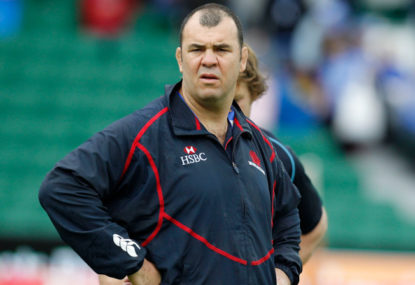Let’s wind the clock back three months. The Waratahs had just won the Super Rugby title, beating the Crusaders in an epic match in front of over 61,000 fans, ending an era of under achievement and years of disappointment for supporters of the Sydney franchise.
A new national competition was due to begin, heralded as the launching pad for the supremely talented unknown names of Australian rugby.
Its fundamental role was to act as the third tier of rugby in the country, and bridge the gap between provincial and Test match rugby, like the Currie Cup and NPC have done so successfully for South Africa and New Zealand.
The ARU announced a groundbreaking change in the flexibility of central contracts, allowing players who sign long-term with the union the option of an overseas sojourn.
Effective from 2016, its main aim was to keep high-profile personalities like Israel Folau in the code, ensuring increased youth participation at grassroots level, as well as keeping the game afloat financially in the competitive Australian sporting market.
The Wallabies entered into the Rugby Championship in arguably a better place than they had been for quite some time.
Australian rugby was on high. Disgruntled fans had returned with new-found optimism, believing in a return to the golden days of Australian rugby, when our trophy cabinet was full, and the majority of the population, even those who weren’t rugby fans, could name at least half the Wallabies.
We were riding on the crest of a wave not seen since John Eales was captain, and I was belting out the words to ‘Run Wallaby Run’ in the car on the way to my Under 10s Beecroft versus Hillview grand final at TG Milner.
Finally, as we kicked off in the first Bledisloe Cup in Sydney, Ewen McKenzie was head coach, and Kurtley Beale our starting 10.
How quickly things change.
Even after that first drawn Test match with the Kiwis, a match we should have won, the intent by the Wallabies to play an attacking style of rugby was on show. It was wet and windy, but we took quick lineouts, quick taps, refused kicks at goal, and played a style of rugby that supporters had been yearning for.
We travelled to Eden Park the following week with the strong belief that we could end our drought there. Alan Jones was interviewed about 50 times in the week leading up to the match, as the last coach to win at the ground, and rugby took up more than just one page in the Friday newspaper.
If ever there was a time for rugby in Australia to put itself back on the map, now was it.
Unfortunately, it didn’t go to script. We were battered by an All Blacks team who sought to put an end to a barrage of criticism from their own media about their performance the previous week.
It all went downhill from there. Although scrappy home wins followed over Argentina and South Africa, we were beaten away by the same teams, and then continued our dry run against New Zealand, stretching their unbeaten run against us to 10 matches.
As the Wallabies departed on their annual spring tour, without both McKenzie and Beale, the game in Australia is in a worse position than ever.
While there is scintillating rugby on show, and the success of the new rules is clear to see, the NRC has failed to draw crowds, and television audiences for the one live Thursday night fixture are nowhere near the height of other rival codes.
It was no wonder the Wallabies exited the country swiftly and with little noise, eager to get away from the media circus surrounding ARU headquarters and concentrate on finishing the season with some sort of form going into a World Cup year under new coach Michael Cheika.
While results over the next month in Europe are important, and will go a long way in softening the response they receive from the media and public when they return home, it’s the progress made off the field, laying a solid foundation both in management structure as well as team culture, that the Wallabies need to get out of this tour.
Cheika, by the sounds of those who have played under him, and the impressive record that he has at provincial level both at home and abroad, is the right man for the job. Apart from his success on the field, it’s his ability to galvanise a team – in a no frills approach, demanding respect and responsibility from each individual – that the Wallabies so desperately needs.
He took the Waratahs, perennial under-achievers, to the Super Rugby title this year with a coaching framework built on trust, honesty, and hard work – traits that are fundamental to any professional outfit. It’s why he is the perfect man for the job at this point in time.
Those that have gone before him, Robbie Deans and Ewen McKenzie, are by no means bad coaches, their records speak for themselves, but it’s Cheika’s man management that sets him apart.
In an era where senior players and individuals do a lot of the coaching themselves, both on the training and playing field, it’s the way they are managed off it, creating a positive and challenging environment, that breeds success.
His experience in coaching in Europe with Leinster and Stade Francais will also help the Wallabies on the tour, as it’s the last time they will come face to face with their Northern Hemisphere counterparts before next year’s World Cup.
Every rugby side is awash with differing personalities, a mix of youth and experience. Getting them on the same page off the field goes a long way to how they perform on it. I see that as Cheika’s main goal, and it starts this week against the Barbarians.





























































































